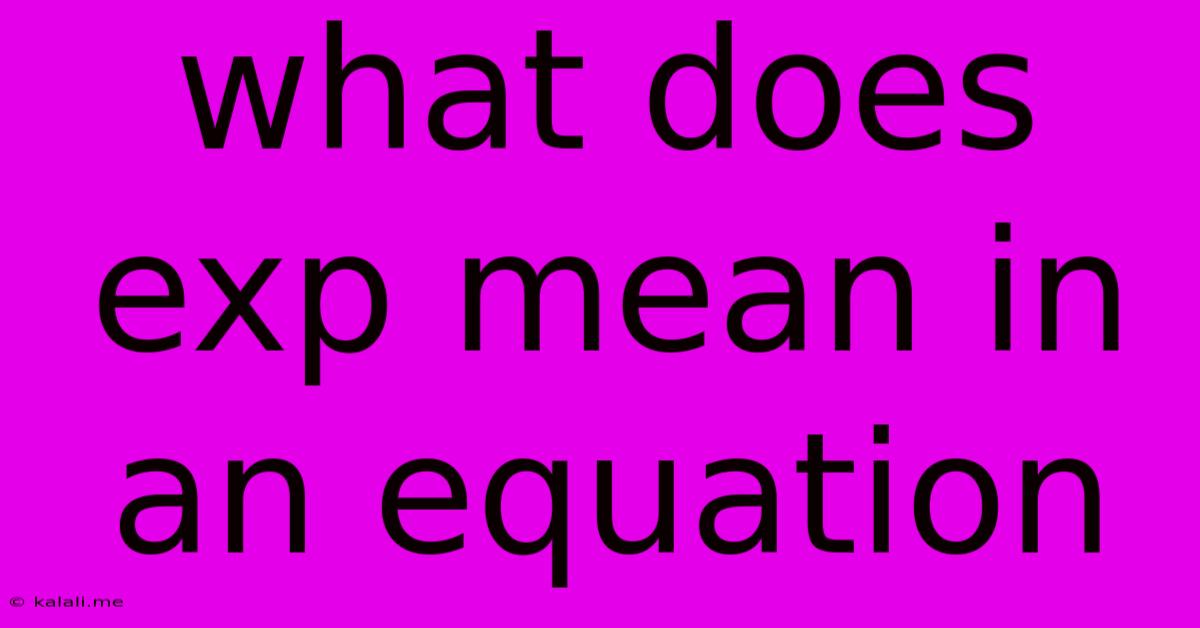What Does Exp Mean In An Equation
Kalali
Jun 02, 2025 · 3 min read

Table of Contents
What Does EXP Mean in an Equation? Understanding the Exponential Function
The term "EXP" in an equation represents the exponential function, typically denoted as e<sup>x</sup> where 'e' is Euler's number (approximately 2.71828) and 'x' is the exponent. This function is ubiquitous in mathematics, science, and engineering, describing phenomena involving growth or decay at a rate proportional to the current value. Understanding its meaning and applications is crucial for interpreting various equations. This article will delve into the meaning of EXP, its properties, and practical applications.
Understanding Euler's Number (e)
Before diving into the exponential function, it's essential to understand the constant 'e'. Unlike constants like π (pi), which has a geometric definition, 'e' arises from the concept of compound interest and calculus. It's defined as the limit of (1 + 1/n)<sup>n</sup> as n approaches infinity. This seemingly abstract definition leads to a powerful function with numerous applications.
The Exponential Function: e<sup>x</sup>
The exponential function, e<sup>x</sup>, represents continuous exponential growth or decay. The value of 'x' determines the rate and direction of the change.
- Positive x: Indicates exponential growth. As x increases, e<sup>x</sup> increases rapidly.
- Negative x: Indicates exponential decay. As x decreases (becomes more negative), e<sup>x</sup> approaches zero.
- x = 0: e<sup>0</sup> = 1. This is the starting point of exponential growth or decay.
Properties of the Exponential Function
The exponential function possesses several key properties that make it so useful:
- Derivative: The derivative of e<sup>x</sup> is e<sup>x</sup> itself. This unique property simplifies many calculations in calculus and differential equations.
- Integral: The integral of e<sup>x</sup> is also e<sup>x</sup> plus a constant of integration.
- Inverse Function: The inverse function of e<sup>x</sup> is the natural logarithm, ln(x). This relationship is fundamental in solving exponential equations.
- Exponential Growth and Decay Models: The function is used to model a wide range of phenomena, including population growth, radioactive decay, compound interest, and the spread of diseases.
Applications of the Exponential Function
The applications of the exponential function are vast and span diverse fields:
- Physics: Describes radioactive decay, the behavior of capacitors and inductors in electrical circuits, and many aspects of quantum mechanics.
- Biology: Models population growth, the spread of diseases, and the decay of biological substances.
- Finance: Used in compound interest calculations, option pricing models, and other financial applications.
- Chemistry: Describes chemical reaction rates and other processes.
- Computer Science: Found in algorithms related to growth and decay, data structures, and many more.
EXP in Different Contexts
While e<sup>x</sup> is the most common representation, you might encounter EXP(x) in programming languages, spreadsheets (like Excel), or calculators as a shorthand notation for the exponential function. It serves the same purpose: to calculate e<sup>x</sup>.
Conclusion
The term EXP, representing the exponential function e<sup>x</sup>, is a cornerstone of mathematics and its applications. Understanding its properties and significance is essential for anyone working with equations, models, or phenomena involving continuous growth or decay. From the intricacies of quantum physics to the complexities of financial markets, the exponential function plays a crucial role in explaining and predicting the world around us.
Latest Posts
Latest Posts
-
Shrink Gap Between Y Ticks Matplotlib
Jun 04, 2025
-
Did Pharaoh Die At The Red Sea
Jun 04, 2025
-
How Long Does An Oven Take To Preheat To 400
Jun 04, 2025
-
Can You Start A Sentence With Of Which
Jun 04, 2025
-
How To Describe The Noise Shoes Ake In Writing
Jun 04, 2025
Related Post
Thank you for visiting our website which covers about What Does Exp Mean In An Equation . We hope the information provided has been useful to you. Feel free to contact us if you have any questions or need further assistance. See you next time and don't miss to bookmark.